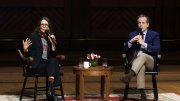A former harvard president once told me, “The arts may be a nice diversion, but they’re just not that important at Harvard.” Despite this anecdotal opinion, with which I naturally take issue, numerous alumni have risen to prominence in the arts, media, and in entertainment. It is axiomatic that many Harvard graduates are destined for greatness in their chosen paths, whether because of, or in spite of, what the University offers them as students; those of us who believe in the transformative potential of the Harvard experience certainly hope for the former.
Graduating students are often blessed with an abundance of career opportunities in their respective fields, thanks partly to University resources dedicated to helping them move from academic study to professional endeavors. But it is widely acknowledged within the alumni community that students seeking to realize their arts-related ambitions receive less attention and fewer resources than those in more traditional areas such as law, medicine, or—my personal bête noire—investment banking.
When President Drew Faust commissioned a special task force to explore the role of the arts at Harvard, my fellow graduates in creative fields responded with enthusiasm. Perhaps this signaled a sea change, a shakeup in the status quo—maybe Harvard finally cared! Though the recommendations of the task force were comprehensive and commendable, the timing of its report, released in late 2008, could not have been worse. As the world economy crumbled, it became apparent that many of the hoped-for changes would be long delayed at best, or—more likely—ignored or forgotten amid the financial turmoil.
But I remain hopeful. I believe that Harvard will continue to expand curricular programs in the arts and media, and that it will ultimately rise to the challenge of elevating and integrating this important domain with other academic priorities. In doing so, Harvard should not lose sight of the infrastructure that already exists to foster the development of gifted student artists (as well as future arts patrons). The freedom and richness of student art-making, powered by the Office for the Arts, allow for the kind of exploration and risk-taking that beget meaningful work and enable personal growth.
Art is not a diversion, but rather an essential expression of the human condition, and its significance will only grow as our world becomes increasingly interconnected and rich in media. To remain part of the global conversation, Harvard needs to ensure that its facilities, curriculum, extracurricular activities, and career services in the arts meet the high standards set by 375 years of excellence. My hope for the next 25 years is that Harvard will find a way to commit the necessary energy, effort, and resources to support this core part of the University experience.
Mia Riverton ’99 is an actor, writer, producer, and musician based in Los Angeles. She is a founder and president of the University-recognized Shared Interest Group Harvardwood, a nonprofit organization for Harvardians in the arts, media, and entertainment, as well as a founding member of the Harvard Arts Resource Council.









